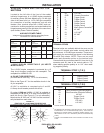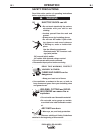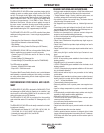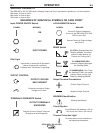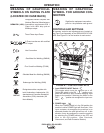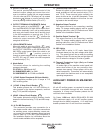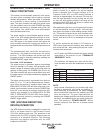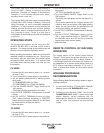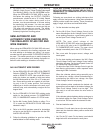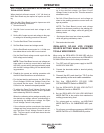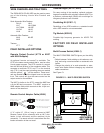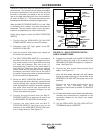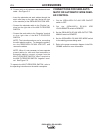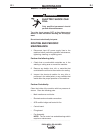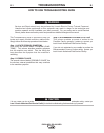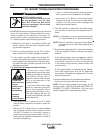
""%&'%!(!&"%'!
*''%J)%!')
!!%&)&( %%"%&'
*! "&
Following are some basic arc striking techniques that
apply to all wire feed processes. Using these procedures
should provide trouble-free starting. These procedures
apply to single, solid wires and Innershield wires.
1. Cut the electrode to a sharp point.
2. Set the NA-3 Open Circuit Voltage Control to the
same dial setting as the Arc Voltage Control. If this is
a new welding procedure, a good starting point is to
set the Open Circuit Voltage Control to # 6.
NOTE: The open circuit voltage of the
IDEALARC® DC-600 VRD varies from approximate-
ly 16 volts to 56 volts in the CV INNERSHIELD or
CV SUBMERGED ARC modes. The open circuit
voltage is essentially zero in the CC STICK mode.
3. Run a test weld. Set proper current, voltage, and
travel speed.
• For the best starting performance, the NA-3 Open
Circuit Voltage Control and Voltage Control setting
should be the same. Set the Inch Speed Control for
the slowest inch speed possible.
• To adjust the Open Circuit Voltage Control to get the
best starting performance, make repeated starts
observing the NA-3 voltmeter.
When the voltmeter pointer swings smoothly up to
the desired arc voltage, without undershooting or
overshooting the desired arc voltage, the Open
Circuit Voltage Control is set properly.
If the voltmeter pointer overshoots the desired volt-
age and then returns back to the desired voltage, the
Open Circuit Voltage Control is set too high. This
can result in a bad start where the wire tends to
"Blast off."
If the voltmeter pointer hesitates before coming up to
the desired voltage, the Open Circuit Voltage Control
is set too low.This can cause the electrode to stub.
4. Start and make the weld.
• Cold starts. For cold starts, be sure the work piece is
clean and the electrode makes positive contact with
the work piece.
• Hot "On the Fly" starts. For hot starts, travel should
begin before the wire contacts the work piece.
"#%'"!
%J)%
3. Air/Carbon Arc Cutting (AAC) / Stick Welding
(SMAW) / High Current, Large Puddle Submerged
Arc Welding (SAW): Use the &' mode.
When the IDEALARC® DC-600 VRD is used for
Air/Carbon Arc cutting, the OUTPUT CONTROL
potentiometer should be set to "9" initially. Based
on the size of the carbon being used or the
process, turn the potentiometer to a lower setting
as required by the process. You can use carbon
rods up to 3/8" in diameter at currents as high as
750 amps with excellent arc control. The welder
protection circuit protects the machine from
extremely high short circuiting pulses.
& ('" '!
('" '*%!*'
'%J)%!
*%%&
When using the IDEALARC® DC-600 VRD with semi-
automatic or automatic wire feeding equipment and
for stick welding or air/carbon arc cutting, it is recom-
mended that the optional MULTI-PROCESS SWITCH
be used. This switch permits you to easily change the
polarity of the connected wire feeding equipment or
switch to stick welding or air/carbon arc cutting.
!('" '*%%
1. Set the IDEALARC® DC-600 VRD LOCAL/REMOTE
Switch to REMOTE. Set the OUTPUT TERMINALS
switch to REMOTE. NOTE: Later model NA-3 auto-
matic wire feeders are capable of cold starts when
the NA-3 Mode switch is in the CV or CC mode posi-
tion. Some earlier models are capable of cold start-
ing only in the CC mode position. Cold starting
enables you to inch the wire down to the work, auto-
matically stop, and automatically energize the flux
hopper valve.
2. Set the IDEALARC® DC-600 VRD welding mode
switch for the desired process: CV SUBMERGED
ARC, CV INNERSHIELD mode or CC STICK mode.
3. Set the NA-3 mode Switch Position to either CV or
CC to match the IDEALARC® DC-600 VRD mode
selected in step 2.
4. Refer to the NA-3 operators manual for instructions
on how to use the NA-3 in conjunction with the IDE-
ALARC® DC-600 VRD.
5. Follow the following guidelines for good arc striking
detailed below for each welding mode.



